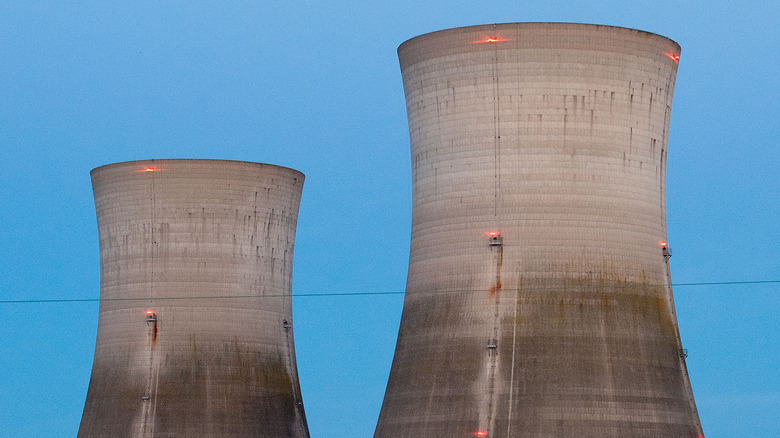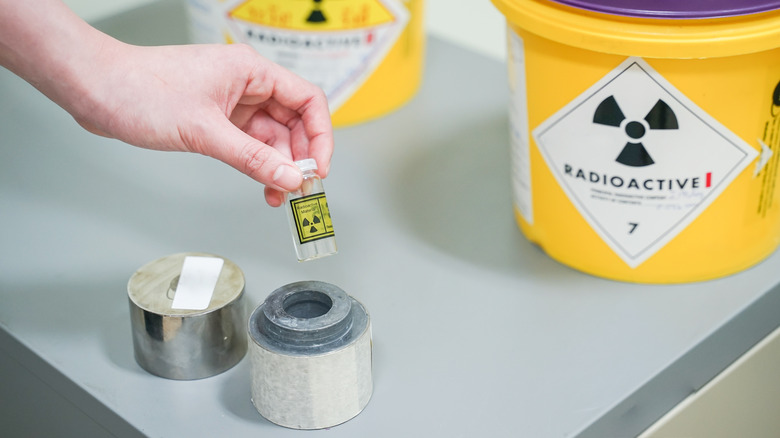Did The Three Mile Island Meltdown Cause Any Deaths?
In late March, 1979, the reactor core at the Three Mile Island nuclear power plant began to overheat. As a result, local communities in the area nearby Three Mile Island — located in the Susquehanna River near Pennsylvania's capital, Harrisburg — were put on high alert. Many people evacuated, but was anyone killed? The four-part Netflix documentary series, "Meltdown: Three Mile Island," explores this question, as well as the subsequent investigation following the accident, and even a possible cover-up about what really caused it, and what the long-term affects of the accident might truly be.
At the time that temperatures began to rise to unsafe levels at Three Mile Island, a failsafe pressure relief system also malfunctioned. There was a partial meltdown in one nuclear core, while cooling water flowed freely from the rapidly warming center. Although a larger meltdown was narrowly averted, the Three Mile Island incident was the worst nuclear accident in U.S. history, per the U.S. Nuclear Regulatory Commission. As is often the case with nuclear power, the true danger from similar accidents might not show up right away. Instead, the negative effects of radiation exposure can sometimes reveal themselves long after things are declared safe.
The Three Mile Island investigation
The Three Mile Island nuclear power plant was in operation for a bit more than a year when the accident happened. At that time, commercial nuclear energy was thought by some to be the way of the future, per International Atomic Energy Agency (IAEA). The response to Three Mile Island played a part in curbing its spread. Once the dire issue at Three Mile Island was found out, it was thought early on that all local residents needed to do to be safe was shut their doors and windows and stay inside. Gradually though, the scale of the potential disaster became clear and many nearby areas were evacuated, according to PennLive.
Once the issue was deemed under control, an investigation revealed just what had happened. Not only had half the reactor core melted down, ionized radiation was released into the air, and large amounts of uranium were compromised. According to the official report, radiation exposure was deemed no more than an average x-ray, and in the immediate aftermath of the accident nobody was killed. In the intervening years since it happened, though, there is ample anecdotal evidence that serious negative health problems for the local population have cropped up, possibly leading to death in some cases.
Some types of cancer are on the rise
Although no one was directly killed in the Three Mile Island nuclear power plant partial meltdown, subsequent studies have explored the long-term effect of nuclear exposure on the local population. One 2017 study found that the incidence of certain thyroid cancers was up due to radiation exposure in the surrounding area, as Wiley Online Library explains. Depending on the type of thyroid cancer, odds of survival are relatively good but roughly 2,000 people die from cancers of this type each year in the United States. More than 40,000 people die from forms of thyroid cancer worldwide, according Cancer, the official website of the American Society of Clinical Oncology.
Although official conclusions ruled that no one was killed as a result of the Three Mile Island disaster, it's clear there's more to the story. The high levels of exposure caused long term negative health consequences that are studied to this very day. The Three Mile Island nuclear power plant resumed operation after the disaster, and remained in operation until 2019, when the Exelon Corporation announced it would close down the plant for financial reasons, according to Exelon Corp, the company's website. Exelon operates Three Mile Island now, but was not involved in plant operation at the time of the partial meltdown. The trailer for Netflix's "Meltdown: Three Mile Island" is available to stream now on Youtube.


